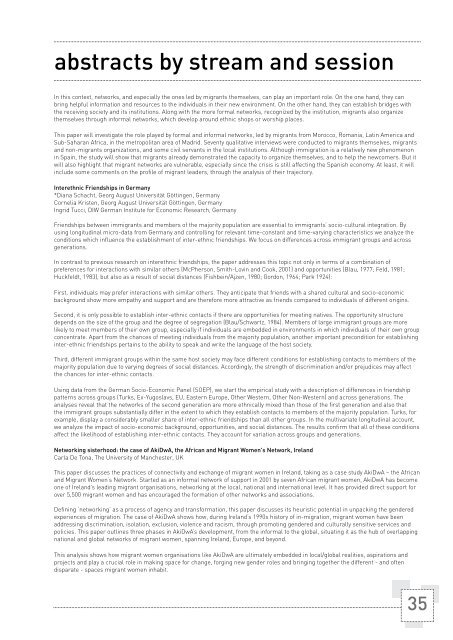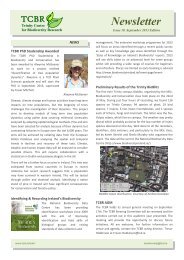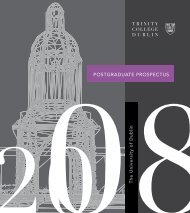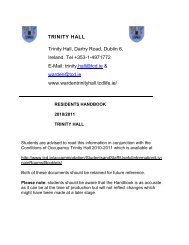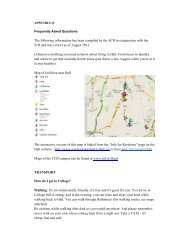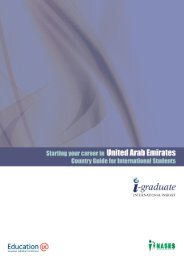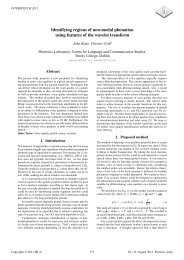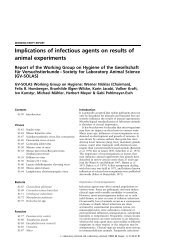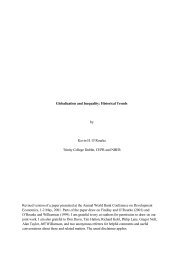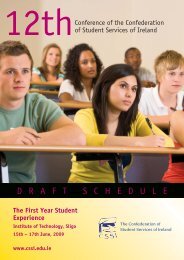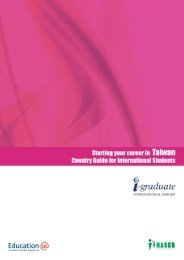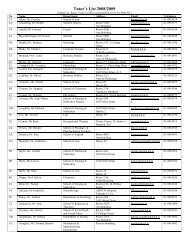Conference Programme (PDF, 1019KB) - Trinity College Dublin
Conference Programme (PDF, 1019KB) - Trinity College Dublin
Conference Programme (PDF, 1019KB) - Trinity College Dublin
You also want an ePaper? Increase the reach of your titles
YUMPU automatically turns print PDFs into web optimized ePapers that Google loves.
abstracts by stream and session<br />
In this context, networks, and especially the ones led by migrants themselves, can play an important role. On the one hand, they can<br />
bring helpful information and resources to the individuals in their new environment. On the other hand, they can establish bridges with<br />
the receiving society and its institutions. Along with the more formal networks, recognized by the institution, migrants also organize<br />
themselves through informal networks, which develop around ethnic shops or worship places.<br />
This paper will investigate the role played by formal and informal networks, led by migrants from Morocco, Romania, Latin America and<br />
Sub-Saharan Africa, in the metropolitan area of Madrid. Seventy qualitative interviews were conducted to migrants themselves, migrants<br />
and non-migrants organizations, and some civil servants in the local institutions. Although immigration is a relatively new phenomenon<br />
in Spain, the study will show that migrants already demonstrated the capacity to organize themselves, and to help the newcomers. But it<br />
will also highlight that migrant networks are vulnerable, especially since the crisis is still affecting the Spanish economy. At least, it will<br />
include some comments on the profile of migrant leaders, through the analysis of their trajectory.<br />
Interethnic Friendships in Germany<br />
*Diana Schacht, Georg August Universität Göttingen, Germany<br />
Cornelia Kristen, Georg August Universität Göttingen, Germany<br />
Ingrid Tucci, DIW German Institute for Economic Research, Germany<br />
Friendships between immigrants and members of the majority population are essential to immigrants’ socio-cultural integration. By<br />
using longitudinal micro-data from Germany and controlling for relevant time-constant and time-varying characteristics we analyze the<br />
conditions which influence the establishment of inter-ethnic friendships. We focus on differences across immigrant groups and across<br />
generations.<br />
In contrast to previous research on interethnic friendships, the paper addresses this topic not only in terms of a combination of<br />
preferences for interactions with similar others (McPherson, Smith-Lovin and Cook, 2001) and opportunities (Blau, 1977; Feld, 1981;<br />
Huckfeldt, 1983), but also as a result of social distances (Fishbein/Ajzen, 1980; Gordon, 1964; Park 1924):<br />
First, individuals may prefer interactions with similar others. They anticipate that friends with a shared cultural and socio-economic<br />
background show more empathy and support and are therefore more attractive as friends compared to individuals of different origins.<br />
Second, it is only possible to establish inter-ethnic contacts if there are opportunities for meeting natives. The opportunity structure<br />
depends on the size of the group and the degree of segregation (Blau/Schwartz, 1984). Members of large immigrant groups are more<br />
likely to meet members of their own group, especially if individuals are embedded in environments in which individuals of their own group<br />
concentrate. Apart from the chances of meeting individuals from the majority population, another important precondition for establishing<br />
inter-ethnic friendships pertains to the ability to speak and write the language of the host society.<br />
Third, different immigrant groups within the same host society may face different conditions for establishing contacts to members of the<br />
majority population due to varying degrees of social distances. Accordingly, the strength of discrimination and/or prejudices may affect<br />
the chances for inter-ethnic contacts.<br />
Using data from the German Socio-Economic Panel (SOEP), we start the empirical study with a description of differences in friendship<br />
patterns across groups (Turks, Ex-Yugoslavs, EU, Eastern Europe, Other Western, Other Non-Western) and across generations. The<br />
analyses reveal that the networks of the second generation are more ethnically mixed than those of the first generation and also that<br />
the immigrant groups substantially differ in the extent to which they establish contacts to members of the majority population. Turks, for<br />
example, display a considerably smaller share of inter-ethnic friendships than all other groups. In the multivariate longitudinal account,<br />
we analyze the impact of socio-economic background, opportunities, and social distances. The results confirm that all of these conditions<br />
affect the likelihood of establishing inter-ethnic contacts. They account for variation across groups and generations.<br />
Networking sisterhood: the case of AkiDwA, the African and Migrant Women's Network, Ireland<br />
Carla De Tona, The University of Manchester, UK<br />
This paper discusses the practices of connectivity and exchange of migrant women in Ireland, taking as a case study AkiDwA – the African<br />
and Migrant Women’s Network. Started as an informal network of support in 2001 by seven African migrant women, AkiDwA has become<br />
one of Ireland’s leading migrant organisations, networking at the local, national and international level. It has provided direct support for<br />
over 5,500 migrant women and has encouraged the formation of other networks and associations.<br />
Defining ‘networking’ as a process of agency and transformation, this paper discusses its heuristic potential in unpacking the gendered<br />
experiences of migration. The case of AkiDwA shows how, during Ireland’s 1990s history of in-migration, migrant women have been<br />
addressing discrimination, isolation, exclusion, violence and racism, through promoting gendered and culturally sensitive services and<br />
policies. This paper outlines three phases in AkiDwA’s development, from the informal to the global, situating it as the hub of overlapping<br />
national and global networks of migrant women, spanning Ireland, Europe, and beyond.<br />
This analysis shows how migrant women organisations like AkiDwA are ultimately embedded in local/global realities, aspirations and<br />
projects and play a crucial role in making space for change, forging new gender roles and bringing together the different - and often<br />
disparate - spaces migrant women inhabit.<br />
35


